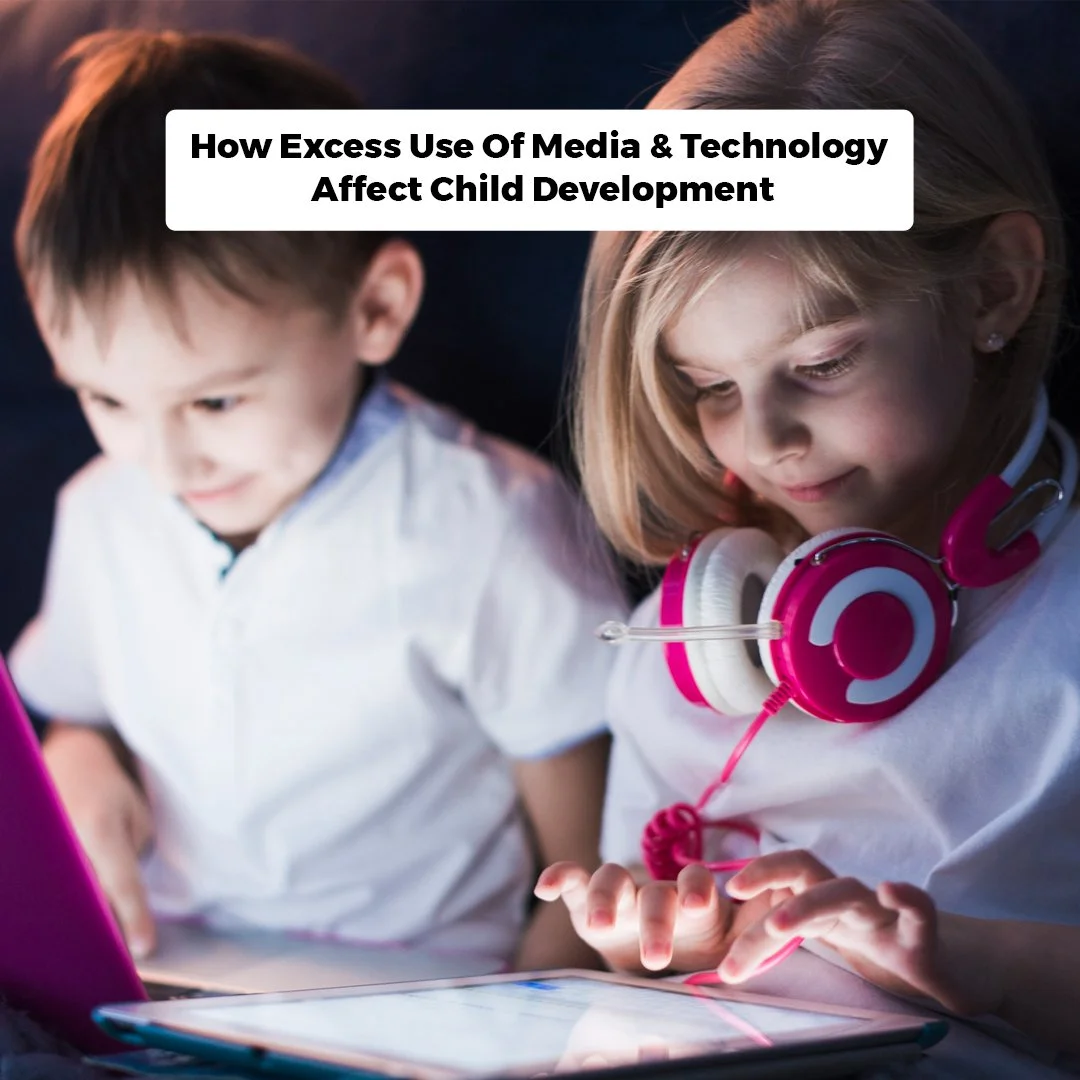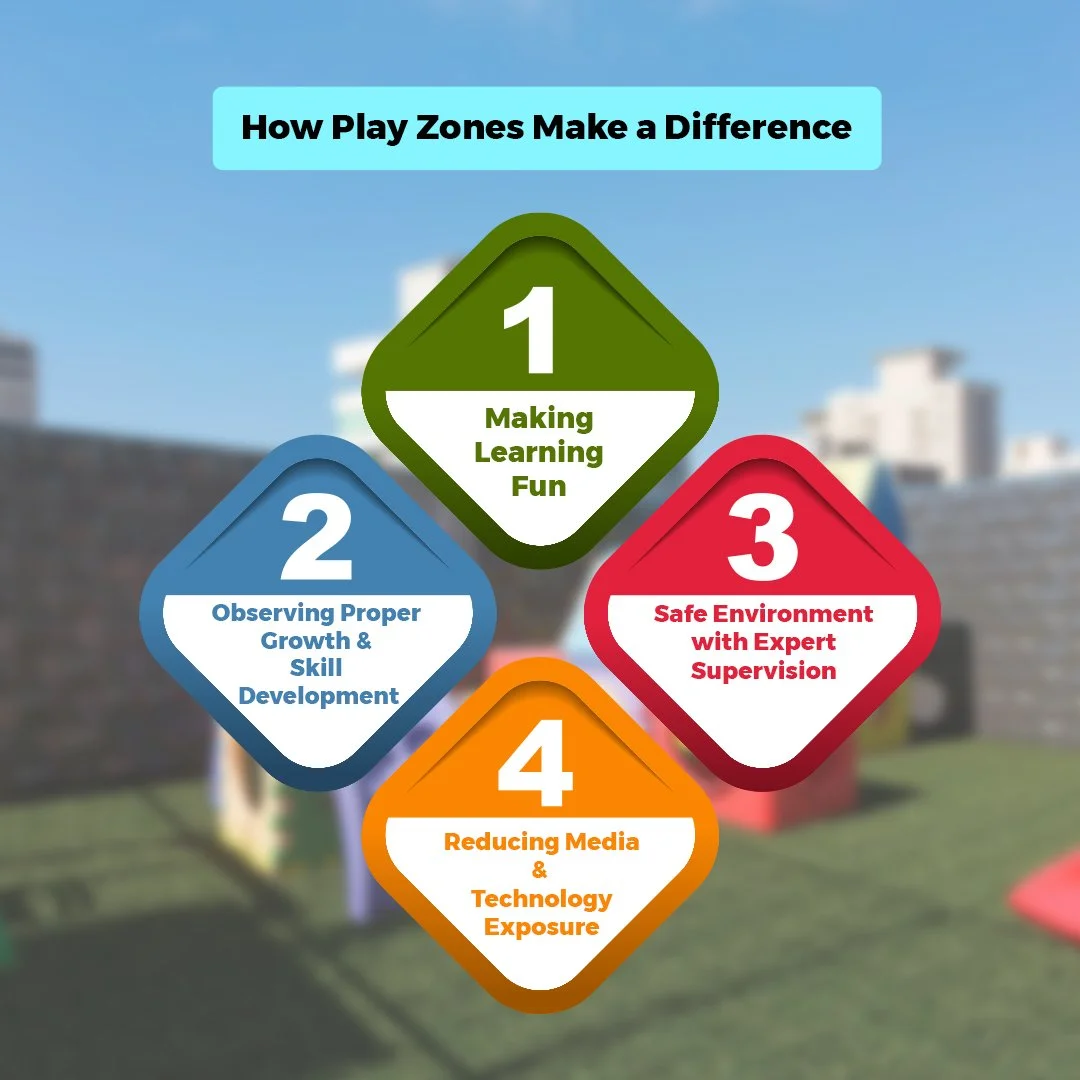How Excess Use Of Media & Technology Affect Child Development
Imagine your child waking up and reaching for a screen before even rubbing their eyes. Hours pass - fingers swiping, eyes glued, minds absorbed, while the real world fades into the background. Before they can even ride a bike, they’ve mastered navigating apps, yet struggle with simple outdoor play. This digital dependence is silently shaping child development, replacing hands-on learning with passive screen time.
Technology is everywhere, influencing how children grow, learn, and interact. While it offers learning opportunities, excessive use disrupts child development, stealing real-world experiences—running, jumping, socialising, and exploring. It replaces bedtime stories with late-night scrolling, outdoor adventures with virtual worlds, and friendships with fleeting online interactions.
As parents, it’s not at all right to overlook the silent damage. Poor sleep, declining social skills, rising anxiety, and even obesity creep in unnoticed. The digital age isn’t slowing down, but neither should your concern. The good news? There’s a way to restore balance. A place where children can thrive, learn, and grow beyond the screen.
Let’s explore how play zones can be the antidote to a screen-heavy childhood and support healthy child development.
Impact of Excessive Media & Technology on Child Development
In today’s digital world, media and technology are a significant part of childhood. However, when used excessively, they can severely hinder child development, often in ways that aren't immediately obvious. Let’s take a closer look at how too much screen time can be detrimental to your child’s growth and overall well-being.
The Obesity Link
One of the most alarming consequences of excessive screen time is its direct connection to being overweight. With children spending hours in front of screens, they lead increasingly sedentary lifestyles. Lack of physical activity and constant snacking while watching shows or playing games leads to weight gain. This disruption in child development can set the stage for health problems such as diabetes, heart disease, and poor physical fitness in the long term. Encouraging physical activity can help mitigate this issue and support healthier growth.
Watching Risky Behaviours
Excessive exposure to media can also influence children to imitate dangerous actions. When they see risky behaviours, whether it’s reckless driving, bullying, or unsafe stunts they may believe that these actions are acceptable or even thrilling. These behaviours can directly impact child development by promoting bad habits, poor decision-making, and a lack of understanding of real-world consequences. It's essential to guide children in distinguishing between entertainment and reality to prevent the adoption of harmful behaviours.
Seeing Violence
Children who watch violent content often exhibit aggression and a desensitization to violence. Studies show that violent media, especially when watched repeatedly, can make children more likely to engage in aggressive behaviour. This impacts their child's development, particularly in their social skills, emotional regulation, and ability to resolve conflicts peacefully. The constant exposure to violence can also create a sense of fear or insecurity, affecting a child’s mental well-being and ability to interact with others in a healthy, positive manner.
Impact on Mental Health
Social media, in particular, places immense pressure on children, leading to increased anxiety, depression, and loneliness. The need to gain social approval and be constantly connected can affect their self-esteem and body image. This emotional strain takes a toll on child development, as mental health issues can lead to difficulty concentrating, making friends, or developing emotional resilience. Balancing screen time with in-person interactions and real-world activities is crucial for maintaining positive mental health.
Weak Eyesight
Extended periods of screen time can cause significant strain on a child's eyesight. The blue light emitted from screens can lead to digital eye strain, causing headaches, blurred vision, and even long-term vision problems. This can hinder a child’s child development, as vision is essential for engaging in outdoor activities, learning, and even socialising with peers. Encouraging breaks from screens and outdoor play can help protect their eyesight and foster healthy growth.
Too Many Commercials
One of the less-discussed impacts of media consumption is the influence of advertising. Children are often exposed to numerous unfiltered ads promoting unhealthy foods, sugary drinks, and toys that encourage materialism. These ads have a significant impact on child development, shaping preferences, and sometimes leading to poor dietary habits. Limiting exposure to these commercials or teaching children to recognise advertising tactics can help prevent unhealthy habits and promote healthier choices.
Effect on Growth & Sleep
Screen time disrupts sleep patterns, which is crucial for child development. Exposure to screens, especially before bedtime, interferes with the body’s production of melatonin, the hormone responsible for regulating sleep. This can lead to difficulties falling asleep, poor quality sleep, and even sleep deprivation. Sleep is a critical factor for a child’s growth, learning, and emotional stability, so ensuring proper rest is essential for healthy development.
Cyberbullying
Lastly, excessive media use opens children up to the risks of cyberbullying. Online platforms can expose children to harmful comments, bullying, and peer pressure that can affect their emotional well-being. This type of psychological harm can leave long-lasting scars on a child’s self-esteem, social skills, and overall mental health, all of which are critical aspects of child development. Monitoring online activity and having open conversations about safe internet use are crucial in protecting children from cyberbullying.
As we can see, excessive media and technology use can severely hinder a child’s physical, emotional, and social development. However, there’s a solution that can provide balance and healthier growth: play zones. Let’s explore how these environments can help restore the balance and positively support child development.
How Play Zones Make a Difference
As parents, you want your child to grow and learn in a safe, stimulating environment. Play zones offer the perfect solution, providing a space where children can not only have fun but also develop essential life skills away from screens. Here’s how play zones can make a real difference in child development:
Making Learning Fun
Play zones like Wonderland Play turn learning into an adventure.
With interactive, skill-building activities like obstacle courses, creative play, and problem-solving games, children can learn while having fun.
These activities foster physical coordination, enhance cognitive skills, and encourage teamwork—all essential elements of child development.
Instead of being passive consumers of media, children actively engage, improving their mental and physical capabilities in ways that are enjoyable and natural.
Observing Proper Growth & Skill Development
In a play zone or a play centre, parents have the opportunity to witness their child’s development firsthand.
Whether it’s mastering a new physical skill, like climbing or balancing, or learning social skills through group activities, parents can see their children grow and acquire essential life skills at the right time.
This real-time feedback helps parents better understand their child’s development and provide the support needed for further growth.
Safe Environment with Expert Supervision
Soft Play zones offer a controlled environment where children can play safely.
Expert supervision by trained professionals ensures that children are not only engaged in appropriate activities but are also protected from harm.
This reduces parents' concerns about their child's safety and allows them to relax and enjoy watching their child thrive.
With experts at hand, children can fully engage in child development activities with minimal risk.
Reducing Media & Technology Exposure
One of the biggest benefits of soft play centres is their ability to limit screen time.
With activities designed to keep kids physically active and mentally engaged, play zones provide a healthy alternative to the passive consumption of media.
By encouraging children to move, interact, and explore, these environments help parents manage their child's screen time and promote a balanced lifestyle that nurtures overall development.
By providing a safe, interactive, and skill-building environment, play zones not only foster child development but also help parents regain control over the amount of time their children spend on screens. Now, let’s look at some other strategies parents can use to balance screen time and encourage healthy growth.
Additional Tips
While play zones are a great step in promoting child development, there are other strategies parents can use to manage screen time and ensure their children’s growth stays on track. Here are some practical actions:
Set Limits
Establish clear rules for screen time. By setting daily limits on media use, you encourage your child to engage in a variety of activities that support child development, such as outdoor play, reading, and creative games.
Monitor Content
Ensure that the media your child consumes is age-appropriate. By closely monitoring the content, you safeguard their mental health and promote positive influences, which contribute to a well-rounded child development experience.
By setting limits and monitoring media, you help your child thrive in a balanced, healthy environment.
Conclusion
Excessive screen time can seriously hinder a child’s development, affecting their physical and mental well-being. However, play zones like Wonderland Play Zone offer a fun and safe alternative, encouraging physical activity and skill-building in a controlled environment.
By opting for interactive play, you can help your child develop healthier habits and essential life skills. So, why wait? Visit Wonderland Play Zone today to support your child's growth and set them on the path to a brighter, healthier future.
Ready to make the change and see your child thrive?
Frequently Asked Question’s
-
Excessive media and technology use can hinder cognitive, social, and physical development by reducing active play, disrupting sleep, and increasing mental health risks.
-
Media influences behaviour, learning, and emotional well-being, often exposing children to inappropriate content, reducing attention spans, and promoting sedentary lifestyles.
-
In the UK, rising screen time has been linked to obesity, poor academic performance, social isolation, and increased anxiety among children.
-
Overuse of technology can cause weak eyesight, sleep disturbances, lower physical activity, and increased exposure to cyberbullying.
-
The seven types include cognitive, emotional, physiological, behavioural, attitudinal, societal, and cultural effects, shaping how individuals think, feel, and act.




